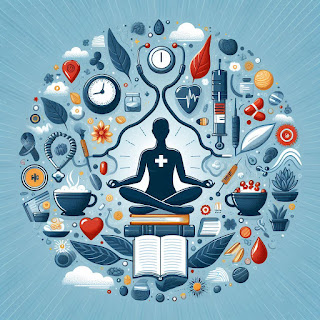In the pursuit of a fulfilling life, one cannot overlook the paramount importance of health and wellness. These two pillars serve as the foundation upon which we build our aspirations, chase our dreams, and savor life's moments. In recent years, the integration of medicine and wellness has become increasingly recognized as a potent synergy in fostering overall well-being. Let's embark on a journey to explore the symbiotic relationship between medicine and wellness, unraveling the secrets to achieving optimal health.
Understanding Health: More Than the Absence of Disease
Health is a multidimensional concept t
hat extends beyond mere absence of illness; it encompasses physical, mental, and social well-being. Achieving and maintaining good health requires a holistic approach that addresses various aspects of our lives.
Physical Health:
Physical health involves taking care of our bodies through proper nutrition, regular exercise, adequate sleep, and avoiding harmful substances. It's about nurturing our bodies with the nutrients they need to function optimally, engaging in physical activities that promote strength and endurance, and prioritizing rest to allow for recovery and rejuvenation.
Mental Health:
Mental health is equally crucial and involves emotional well-being, cognitive function, and the ability to cope with stress and adversity. Practices such as mindfulness, meditation, and therapy can enhance mental resilience, promote positive thinking, and foster emotional balance.
Social Health:
Our social connections play a significant role in our overall health and wellness. Cultivating meaningful relationships, fostering a sense of belonging, and participating in community activities contribute to our social health. Strong social support networks provide emotional sustenance, reduce feelings of isolation, and enhance overall quality of life.
The Role of Medicine: Healing and Beyond
Medicine serves as a cornerstone in the realm of health care, encompassing prevention, diagnosis, treatment, and rehabilitation of illnesses and injuries. Modern medicine has made remarkable advancements, revolutionizing the way we approach healthcare and extending our lifespan. From antibiotics to vaccines, surgeries to medical devices, the arsenal of medical interventions is vast and continually evolving.
Preventive Medicine:
Preventive medicine focuses on averting illnesses and promoting health before they occur. It involves strategies such as vaccinations, screenings, lifestyle modifications, and health education. By identifying risk factors early and implementing preventive measures, we can mitigate the burden of diseases and enhance overall well-being.
Integrative Medicine:
Integrative medicine embodies a holistic approach that combines conventional medical treatments with complementary and alternative therapies. This approach recognizes the interconnectedness of mind, body, and spirit in achieving optimal health. Modalities such as acupuncture, herbal medicine, yoga, and chiropractic care are integrated alongside conventional treatments to address the root causes of illness and promote healing.
Personalized Medicine:
Advancements in genetics and technology have paved the way for personalized medicine, tailoring treatments to individual genetic makeup, lifestyle factors, and environmental influences. This precision approach enables healthcare providers to optimize treatment efficacy, minimize adverse effects, and improve patient outcomes.
While medicine plays a crucial role in treating illnesses and managing symptoms, its synergy with wellness amplifies its impact, leading to better health outcomes and enhanced quality of life.
Lifestyle Medicine:
Lifestyle medicine emphasizes the importance of lifestyle factors—such as diet, exercise, stress management, sleep, and social support—in preventing and treating chronic diseases. By adopting healthy habits and making sustainable lifestyle changes, individuals can reduce their risk of developing various health conditions and optimize their overall well-being.
Holistic Wellness Practices:
Holistic wellness practices encompass a broad spectrum of modalities aimed at nurturing the mind, body, and spirit. These may include yoga, meditation, tai chi, massage therapy, aromatherapy, and nutritional counseling. By incorporating these practices into our daily lives, we can cultivate balance, harmony, and resilience, enhancing our ability to cope with stress and adversity.
Mind-Body Connection:
The mind-body connection underscores the profound interplay between our thoughts, emotions, and physical health. Practices such as mindfulness meditation, guided imagery, and biofeedback harness this connection to promote relaxation, reduce pain, and boost immune function. By fostering a positive mindset and cultivating inner peace, we can tap into the body's innate healing potential.
Empowering Individuals for Optimal Health
At the heart of the convergence between medicine and wellness lies empowerment—the empowerment of individuals to take an active role in their health and well-being. Empowered individuals are informed, engaged, and proactive in making health-related decisions that align with their values and preferences.
Health Education and Awareness:
Education is a powerful tool in empowering individuals to make informed choices about their health. By disseminating accurate, evidence-based information and raising awareness about preventive measures and healthy lifestyle habits, we can empower people to take charge of their health and adopt behaviors that promote wellness.
Patient-Centered Care:
Patient-centered care prioritizes the needs, preferences, and values of individuals, fostering collaboration between healthcare providers and patients in decision-making processes. By involving patients in treatment planning, respecting their autonomy, and addressing their concerns, healthcare providers can empower patients to actively participate in their care and achieve better health outcomes.
Self-Care and Self-Advocacy:
Self-care encompasses practices that individuals engage in to promote their own health, well-being, and happiness. From eating nutritious foods to getting regular exercise, practicing stress management techniques to seeking social support, self-care is an essential component of a healthy lifestyle. Similarly, self-advocacy involves speaking up for one's needs, rights, and preferences in healthcare settings, ensuring that individuals receive the care and support they deserve.








